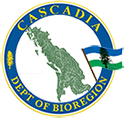Cascadia
Cascadia — the evocative name of a region, an idea, a movement — wild and free, defined by the waters flowing from the continental crest through the headwaters of the Pacific.
But what and where exactly did the name Cascadia arise from? Today, the land of the watersheds of the Columbia, Fraser in traditional Chinook and Chinuk Wawa is known as Cascadia Illahee. We use the word “Cascadia” because pre-colonization there was no unified term for this area and bioregion.
As a modern construct, the name Cascadia was decided by a group of academics, policy makers, activists, back to landers, Indigenous organizers at what became the first Cascadia Bioregional Congress in 1986 at Evergreen State College in Olympia, Washington. This term Cascadia, is an endonym, meaning created from the people living here, rather than an exonym, such as “the Northwest”, a name given by to our region from the outside, and in relation to a colonial power.
The term “Cascades” was first used for the Cascades Rapids, as early as the Astor Expedition. The first written reference originally stems from Scottish botanist David Douglas (for whom the Douglas Fir is also named) who explored the Columbia River Gorge in 1825. He wrote of the area’s ‘cascading waterfalls’, and it is through these that we hear the first mention of ‘the Cascades’ — from which the mountain range is now called. The name ‘Cascadia’ itself wasn’t heard until much later, until it was first used by the town Cascadia, Oregon that was settled in 1890 in what is now Linn County.
It’s first use to define the region was by Bates McKee, in his book “Cascadia: The Geologic Evolution of the Pacific Northwest” in 1975, and in it’s current form as a bioregion by David McCloskey, a professor at the Seattle University in 1981. McCloskey describes Cascadia as “a land of falling waters.” We use this term, because names, terms and definitions matter – and where they don’t previously exist, incredibly important for passing on the messaging and meaning of our bioregion and movement.
This is similar to the renaming of the Puget Sound in Washington and Prince Georgia Straight in British Columbia to the “Salish Sea” in 2012 as a reflection of the whole ecoregion, and to decolonize our border away from the US/Canadian, in honor and respect of the Indigenous Nations who still call this place home.
The term Cascadia Illahee is used at the invitation of the Grande Ronde and Chinook people, who are working to revitalize Chinook Wawa as a regional trade language. Illahee comes from the Chinook world that comprised a network of kin-based villages, and a complex and vast trading network throughout the Cascadia bioregion and North America. This understanding of homeland, as expressed by Illahee was not, like European definitions, predicated on a physical location, boundaries or finite amount of space, but instead was centered around family, friends and allies, and the networks of interrelation that grew from these.
Chinook Jargon was the defacto language of the Cascadia Bioregion pre-European settlement, used by all of the people who made up the Cascadia bioregion, and as a trade language it incorporated different words and cultures as they moved into the region. Post-colonization this included words from Haida, Tlingit, Chinook, Salish, Chinese, French, English, Russian, Filipino, Hawaiian and Spanish. By the late 1800’s, more than 100,000 people spoke this regional language, and was often the first second language of immigrants who moved to the area.
We choose Cascadia to represent our land and movement in recognition that a place is more than simply lines on a map or a physical bioregion – but rather where the heart is, and the people who make it up.
Our Cascadia Illahee means every person who identifies as a citizen of this place and watershed, the values and principles of what that means, and is committed to becoming an ambassador for this idea and movement.


Illahee, illahie, illi’i
Land, country, earth, soil – in both physical and political senses; the apostrophe in the last spelling denotes a glottal stop, as may also the ‘h’ in the other spellings. The Chinook word for ‘homeland’ defined through the connection of people rather than geography – a network of peoples arranged through the interweaving of family, blood marriages, allies.
Cascadia Illahee
The Cascadia region, or the land of the Cascadia people (watersheds of the Columbia, Fraser and Snake). Home. Family.

